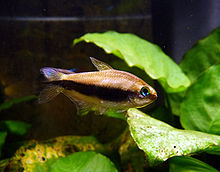- Nematobrycon palmeri
-
Nematobrycon palmeri 
A female Scientific classification Kingdom: Animalia Phylum: Chordata Class: Osteichthyes Order: Characiformes Family: Characidae Genus: Nematobrycon Species: N. palmeri Binomial name Nematobrycon palmeri The Emperor tetra (Nematobrycon palmeri) is found the streams and rivers of western Colombia including the Rio Atrata and the Rio San Juan.
Contents
In the aquarium
The Emperor tetra is a placid aquarium fish and will be disturbed by more boisterous species. It grows to 7.5 cm. It prefers a pH of 6.5, a hardness of 50–100 mg/l and a temperature of 23-27 C. It does not school as readily as most tetras, and a single fish, or a pair appears happier than with most tetras.
Foods and Feeding
The Emperor Tetra is an omnivore, eating both animal and vegetable food. Any good flake or pelleted fish food is a good basis for its diet. IT will benefit from live food like Daphnia and wrigglers (Mosquito larvae) as well as frozen fish food including frozen bloodworms.
Gender
The males and females are easily differentiated. There are many differences; perhaps the easiest one to be sure of is the tail. The male has a three pronged tail with the centre black part extending beyond the rest of the tail while in the female the centre black part only reaches as far as the clear part of the tail.
Breeding
In a large well planted aquarium a single pair of Emperor tetras will often breed without any extra stimulation. If there are no other fish, some of the babies may survive especially if the parents are well fed. In a large, well planted aquarium the babies will find some useful natural food in the form of protozoa, algae, etc. Screened Daphnia will provide them with more nourishment as they grow, and dry fry food can be used.
Appearance
The purple hue of these tetras will be more apparent in an aquarium with floating plants on the surface and relatively subdued lighting. If the aquarium is too bright, the yellow coloration will dominate.
Gallery
See also
List of freshwater aquarium fish species
Sources
- Encyclopaedia of Aquarium and Pond Fish (2005) (David Alderton)
- Emperor tetra fact sheet: http://www.bettatrading.com.au/Emperor-Tetra-Fact-Sheet.php

This Characiformes-related article is a stub. You can help Wikipedia by expanding it.


